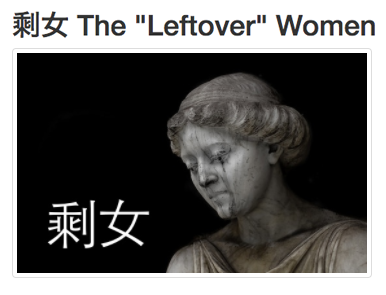International Women’s Day doesn’t need these two words
On March 8th, the accomplishments and continued challenges of women around the world take center stage on a day globally recognized as International Women’s Day (Fùnǚ jié | 妇女节). While themes vary around the world and also vary year to year, the common message of the day is always an underlying focus on women’s long journey towards respect and equality in society, and the continued struggles that modern women face. Actions may speak louder than words, but we must also remember that the choice of one single word in our daily Mandarin vocabulary also carries with it the profound weight of hidden meanings and implications that guide the thoughts and actions of those around us. In reference to two intriguing and informative ChinesePod lessons on the topic of women, below are three ways you can change your Mandarin vocabulary to show your respect towards women, and not just on International Women’s Day, but every day of the year.
-
Drop the words Sānbā | 三八 from International Women’s Day
First, it must be explained that the very words used to describe International Women’s Day in Mandarin is, in fact, Sānbā fùnǚ jié | 三八妇女节, the first two words in itself a derogatory way to refer to women. In our Special Women’s Day lesson shown below, we learn that “Sānbā | 三八” refers to the date of International Women’s Day, which is March 8th, but in daily Mandarin language, this numerical expression is also used to refer to women who are stupid, or can be used to scold women who are not careful of their behavior in public. It can also be used amongst good friends in a joking manner. Widely considered an unfortunate coincidence due to the international selection of the date of this holiday, perhaps the first step in removing discrimination towards women in our daily language is to refer to this special holiday as merely Fùnǚ jié | 妇女节 rather than adding the prefix “sānbā | 三八”. In order to move the needle in the right direction towards equality and respect for women, a good first step is to stop using the word “sānbā | 三八” to describe women altogether, whether in a joking manner or not. As recommended in the Special Women’s Day lesson, let’s drop this demeaning term from our Mandarin vocabulary, and simply wish others Fùnǚ jié kuàilè | 妇女节快乐 going forward. At the same time, remember that throughout Chinese history, as noted by the six outstanding women featured in the Chinesepod lesson shown below, we must respect the fact that all women – regardless of status or profession – strong, brave and confident women have helped change the course of women’s lives through defying tradition and societal pressures placed on them solely because they are women.
https://www.youtube.com/watch?v=7K1K3hD5ZoI
-
Remove Shèngnǚ|剩女 from your Mandarin vocabulary
The second word to pay attention to in your Mandarin vocabulary is the use of the term shèngnǚ|剩女 . In the Chinesepod lesson of this same name shown below, we learn about the meaning and usage of this very common word, often used by both men and women, young and old, across Mainland China, and essentially meaning “left-over women”. Taiwan opted for another word for “left-over women” referred to as “bài quǎn|败犬”, literally translated as “defeated dog”. It essentially means the same as “shèngnǚ|剩女” but is even harder on the ears. Regardless of which term is used, they refer to women who have reached the age of thirty (and sometimes defined as women as young as in their late-twenties) who remain unmarried. It is widely believed that once a woman reaches this age, her chances of finding a suitable spouse dwindles and she is therefore coined a “left-over woman”. The ironic thing is, many of these so-called left-over women are in fact, very intelligent, beautiful, and successful. For such women, the term “shèngnǚ|剩女” often is used to insinuate a seemingly growing stereotype that a woman’s intelligence, independence, drive, or success makes it harder to attract a spouse. Such women are often assumed to have unreasonably high standards or strong personalities – showing us our selection of words have the power to take positive traits and transform them into negative connotations towards women.
Across the globe, to varying degrees, there is a growing trend in modern society for women to marry and have children later in life, often believed to be attributed to the fact that more women are striving for higher education and pursuing career aspirations. A woman who completes a university degree and focuses on her career after graduation has a large chance of being termed a “left-over woman” due to lack of time in her twenties focused on finding a husband following graduation. Perhaps this term will be used less and less as time passes. But for now, in this age of social transition, as we see more and more successful businesswomen and female leaders, we should all do our part to help society move forward by removing the term “shèngnǚ|剩女” from our Mandarin vocabulary. Instead, why don’t we replace it with nǚ qiángrén|女强人?
-
Celebrate Nǚ qiángrén|女强人
Defined as strong women with exceptional abilities, “nǚ qiángrén|女强人” refers to women who are very successful in their careers, often displaying confidence and determination. The term is most often used as a positive way to describe successful women. The growing concept of nǚ qiángrén|女强人shows us that times are indeed changing. As described in the ChinesePod lesson on “leftover women,” ancient Chinese women were expected live up to the idea of sāncóngsìdé | 三从四德, with sāncóng | 三从 referring to the expectation they obey their father when young, obey their husband after marrying, and obey their son after having children.
One of the best examples of a nǚ qiángrén|女强人 is the character of An Di (Andy in English) in the hit 2016 drama Ode to Joy Huānlè Sòng|欢乐颂, a remarkably intelligent and successful woman in the financial industry. Leading men in the drama admire her for both her wits and her beauty, showing Chinese and international audiences that being single and over 30 doesn’t at all equate to being left over with no options for a spouse. In fact, her situation shows us it is quite the opposite in modern Chinese cities such as Shanghai. Overall, this drama provides a very real inside look into the struggles and challenges faced by today’s women in China, as shown through the eyes of five very young different women of varying economic backgrounds, personalities, and ages, all trying in their own way, to balance the challenges of earning money to support themselves (and their families in some cases) with societal pressures of avoiding becoming a “left-over woman.” This drama’s popularity (currently season 2 is in production), shows us that in China, while traditions prevail regarding women’s roles at home, there is a clear trend towards more and more women aspiring towards their own career goals before settling down to get married and have children, further showing us that these women who strive for their own ambitions are both attractive and admirable.
https://www.youtube.com/watch?v=QSH90r3G91g
It’s important to officially recognize great achievements in society and by dedicating an official day to the accomplishments of women and their importance in history. But let’s not stop there. By paying attention to your usage of today’s three Mandarin words introduced – 三八,剩女,and 女强人– you can show your respect for women not just on International Women’s Day, but every day of the year. Doing so will further encourage others around you to use language as the best medium to support the continued global trend of women towards higher education, successful careers, and overall equality.
Are you a powerful woman attempting to do business in Chinese? Our playlist has all the vocabulary you need to be a success.

Eng Chan
Latest posts by Eng Chan (see all)
- International Women’s Day doesn’t need these two words - March 7, 2019
- Chinese New Year Red Envelopes: How to Give and Receive “hóngbāo” Like a Local - February 9, 2019
- 6 Simple Ways Anyone Can Celebrate Chinese New Year - February 7, 2019



Kiwi Leong
April 23, 2017 @ 10:06 am
您們好。我是一個中文學生。我真喜歡這文章,可是我有一個問題。我曾經被男孩叫“女漢子” 可是我不知道有壞的意思沒有。有人可以幫我明白嗎?謝謝您們。
Irene
April 5, 2019 @ 2:30 pm
Great article, so informative. Just that in the video the word Xi in Cixi is third tone not first tone 🙂